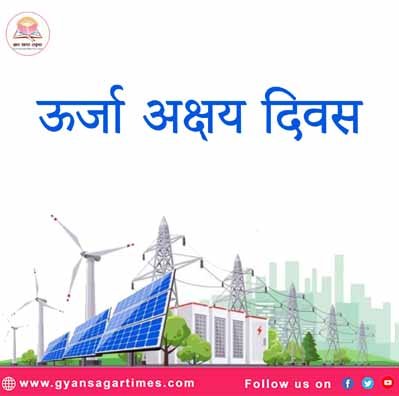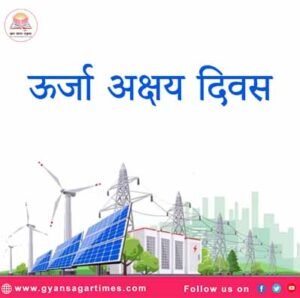
ऊर्जा अक्षय दिवस
हर वर्ष 20 अगस्त को भारत में अक्षय ऊर्जा दिवस मनाया जाता है. यह दिन अक्षय ऊर्जा स्रोतों—जैसे सौर, पवन, जल और जैव ऊर्जा—के प्रति जागरूकता फैलाने और इनके उपयोग को प्रोत्साहित करने के उद्देश्य से मनाया जाता है. यह दिन भारत के पूर्व प्रधानमंत्री श्री राजीव गांधी की जयंती के अवसर पर मनाया जाता है, जिन्होंने विज्ञान और तकनीक को जनकल्याण से जोड़ने की दिशा में कई पहल की थीं.
अक्षय ऊर्जा उन प्राकृतिक स्रोतों से प्राप्त की जाने वाली ऊर्जा है जो कभी खत्म नहीं होते या जिनका फिर से भरण होता रहता है. ये पारंपरिक ऊर्जा स्रोतों (जैसे कोयला, पेट्रोलियम और प्राकृतिक गैस) से अलग हैं, क्योंकि पारंपरिक स्रोत सीमित हैं और उनके जलने से पर्यावरण को भारी नुकसान होता है. उदाहरण – सौर ऊर्जा, पवन ऊर्जा, जल विद्युत ऊर्जा और बायोमास ऊर्जा.
अक्षय ऊर्जा का महत्व –
पारंपरिक ऊर्जा स्रोत जैसे कोयला और पेट्रोलियम प्रदूषण फैलाते हैं, जबकि अक्षय ऊर्जा पर्यावरण के लिए सुरक्षित है. अक्षय ऊर्जा स्रोत कभी समाप्त नहीं होते, जिससे भविष्य की पीढ़ियों के लिए ऊर्जा सुनिश्चित होती है. दीर्घकालिक रूप से अक्षय ऊर्जा की लागत कम होती है और यह ऊर्जा आत्मनिर्भरता को बढ़ावा देती है.
भारत सरकार अक्षय ऊर्जा को बढ़ावा देने के लिए लगातार प्रयास कर रही है. भारत ने वर्ष 2030 तक अपनी 50% बिजली की ज़रूरतों को अक्षय ऊर्जा स्रोतों से पूरा करने का महत्वाकांक्षी लक्ष्य रखा है. सौर ऊर्जा, पवन ऊर्जा और बायोमास जैसे क्षेत्रों में भारत ने काफी प्रगति की है. अंतर्राष्ट्रीय सौर गठबंधन (International Solar Alliance) जैसे वैश्विक मंचों पर भारत की सक्रिय भागीदारी यह दर्शाती है कि वह स्वच्छ ऊर्जा के क्षेत्र में एक वैश्विक नेता बनने के लिए प्रतिबद्ध है.
अक्षय ऊर्जा दिवस हमें यह याद दिलाता है कि हमारी पृथ्वी और आने वाली पीढ़ियों के लिए स्वच्छ और स्थायी भविष्य कितना ज़रूरी है. यह एक ऐसा कदम है जो हमें न सिर्फ ऊर्जा के मामले में आत्मनिर्भर बनाता है, बल्कि पर्यावरण को भी सुरक्षित रखने में मदद करता है.
========== ========= ===========
Akshay Urja Diwas

Every year on 20th August, Akshay Urja Diwas is celebrated in India. This day is celebrated to spread awareness about renewable energy sources—such as solar, wind, hydro and bio-energy—and encourage their use. This day is celebrated on the occasion of the birth anniversary of former Prime Minister of India Shri Rajiv Gandhi, who took many initiatives towards connecting science and technology with public welfare.
Renewable energy is energy obtained from natural sources that are never exhausted or that keep getting replenished. These are different from conventional energy sources (such as coal, petroleum and natural gas), because conventional sources are limited and their burning causes great harm to the environment. Example – solar energy, wind energy, hydroelectric power and biomass energy.
Importance of Renewable Energy –
Conventional energy sources such as coal and petroleum spread pollution, while renewable energy is safe for the environment. Renewable energy sources never get exhausted, ensuring energy for future generations. Renewable energy costs less in the long run, and it promotes energy self-sufficiency.
The Government of India is constantly making efforts to promote renewable energy. India has set an ambitious target of meeting 50% of its electricity needs from renewable energy sources by the year 2030. India has made great progress in areas like solar energy, wind energy and biomass. India’s active participation in global forums like the International Solar Alliance shows that it is committed to becoming a global leader in the field of clean energy.
Renewable Energy Day reminds us how important a clean and sustainable future is for our Earth and future generations. This is a step that not only makes us self-reliant in terms of energy but also helps in protecting the environment.





